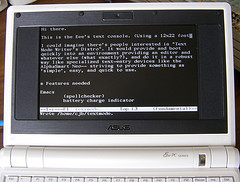
Problably best known for Puckipedia, 13-year-old Puck Meerburg from Delft has been coding since he was six. Meerburg has developed apps for a range of different mobile platforms already, including iOS, Android and BlackBerry.
Although Puck hasn’t quite mastered the art of giving interviews, which is maybe a lot to ask from a 13-year-old, he speaks better English than many of his adult counterparts. I like the way he ‘slags’ Apple for him not knowing how many copies of his apps he has sold. Apple lets people offer them apps that costs them no money at all to develop, which has hundreds of thousands of people (let’s cut the PC nonsense: mostly boys and men) around the world working day and night like slaves in the hopes of being picked up by Apple who apparently takes a whopping 30% off the top.
The Next Web tells us that, “His latest release, CatStacker is based on the growing hype around, you guessed it, placing items on a domestic cat and sharing them via photographs posted online.”
(Link: thenextweb.com, Photo: Photo by William Hook, some rights reserved)

 Two Dutch Linux developers working for Intel in Santa Clara, USA, demonstrated a fast-starting version of Linux at the Linux Plumbers Conference in Oregon (also USA) last September. Arjan van de Ven, developer at Intel’s Open Source Technology Center and author of PowerTOP, and Auke Kok, an OSTC colleague, built their FastBoot system by moving important modules into the kernel (less overhead), and by scrapping less important modules altogether. The latter are ran when necessary. For example, the printing sub-system is only loaded when the user first tries to print something.
Two Dutch Linux developers working for Intel in Santa Clara, USA, demonstrated a fast-starting version of Linux at the Linux Plumbers Conference in Oregon (also USA) last September. Arjan van de Ven, developer at Intel’s Open Source Technology Center and author of PowerTOP, and Auke Kok, an OSTC colleague, built their FastBoot system by moving important modules into the kernel (less overhead), and by scrapping less important modules altogether. The latter are ran when necessary. For example, the printing sub-system is only loaded when the user first tries to print something.